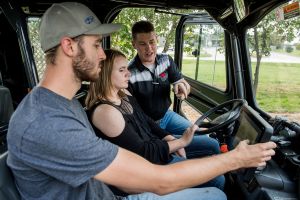

Rob Thomas was a high school technology teacher for nearly five years when he decided he missed working year round on his family’s Western Pennsylvania hobby farm.
To switch careers to agriculture Thomas knew he would need more specialized knowledge. So he searched nationally for an associate degree agronomy program; he did not want to earn another bachelor’s degree. He enrolled at Northeast Community College (Northeast) in Norfolk, Nebraska, in 2017, he said, because it “had one of the best curriculums I saw in the country.”
His next two years of learning were punctuated with stints as a summer intern on the college’s 500-acre farm and part-time work as a teaching assistant and agriculture tutor. His plan had been to look for an agronomy job in Pennsylvania and work on his family’s farm on weekends.
But in May 2019—the day before he graduated from Northeast with two associate of applied science degrees in agronomy and precision agriculture—Thomas was hired as the college’s farm manager. It’s a job that amazingly matches his skills and interests.
As the student speaker at commencement Thomas said, “When you challenge yourself it can be quite amazing what you can learn about yourself and what you actually can accomplish.”
“We’re really lucky to have Rob and we’re glad he took the job,” said Tara Smydra, associate dean of agriculture math and science. She said the hands-on learning opportunities available at the college farm attract students to Northeast, which in addition to several agriculture degrees has animal science and veterinary technician programs.
Because two other staffers take care of the day-to-day tasks on the farm a big part of the farm manager’s job is bringing the data from the farm’s operations in to classrooms, Smydra explained.
During a phone interview about Thomas’s transition from high school teacher to Northeast student and staff member, Smydra said, “He really has a knack for bringing things that are high-level education items to a level that everybody can understand.”
The college’s current applied research studies involve testing no-till planting methods and using cover crops to retain nutrients and promote crop growth in the region’s sandy soils, Thomas explained in a separate phone interview.
At the 2019 ATE Principal Investigators’ Conference, Thomas participated as an alumnus in the student showcase session where he shared data from the college’s farm operations and information about the college’s $785,000 Advanced Technological Education grant from the National Science Foundation—Developing a Precision Agriculture Workforce Ladder through Secondary, College, and Incumbent Worker Education that Integrates Emerging Technologies and Farm Data (LIFT-PA).
Brandon Keller, a business agriculture instructor, serves as principal investigator of LIFT-PA (NSF Award #1700680), which created modular courses that combine hands-on learning with real-world scenarios. Other members of the project team are Chris Brubach and Chance Lambrecht, precision agriculture instructors, and Lonny Mitchell, precision agriculture trainer.
The team designed the curriculum to help teens, college students, and agriculture technicians move up the precision agriculture workforce ladder. “Being a farmer in today’s world you have to know just about everything about how crops are grown, how to market the crops, the business side of the operation,” Thomas said.
One of the most novel aspects of the project is the Precision Agriculture Learning simulator, known as PAL, that the ATE project team devised with computer hardware and software to give students virtual experiences operating large and expensive precision agriculture equipment.
The ATE project is part of Northeast Community College’s effort to help agriculture producers and agriculture technicians utilize new technologies such as sensors and global positioning systems along with sustainable agriculture practices to maximize their efforts.

 Subscribe
Subscribe


 See More ATE Impacts
See More ATE Impacts

Comments
There are no comments yet for this entry. Please Log In to post one.